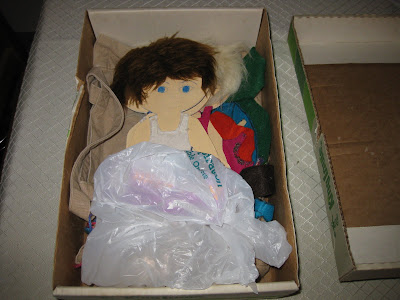In high school I had this Biology teacher who was weird, quirky, creative, strange, and funny. He was one of my favorite teachers, and he deserves a post all his own (maybe Shaina or Kim could more fully describe him...) His name was Dr Wendle. This is one random (there were many random stories and things he would do!) letter he read to us one time, and I made a copy because I thought it so funny. Here it is for your enjoyment...
A Letter from the Smithsonian
The story behind the letter below is that there is this nutball in Newport, RI, named Scott Williams who digs things out of his backyard and sends the stuff he finds to the Smithsonian Institute, labeling them with scientific names, insisting that they are actual archaeological finds. This guy really exists and does this in his spare time!
Anyway... here's the actual response from Smithsonian Institute. Bear this in mind next time you think you are challenged in your duty to respond to a difficult situation in writing.
Smithsonian Institute
207 Pennsylvania Avenue
Washington, DC 20078
Dear Mr. Williams:
Thank you for your latest submission to the Institute, labeled "93211-D,
layer seven, next to the clothesline post... Hominid skull." We have
given this specimen a careful and detailed examination, and regret to inform
you that we disagree with your theory that it represents conclusive proof
of the presence of Early Man in Charleston County two million years ago.
Rather, it appears that what you have found is the head of a Barbie doll, of
the variety that one of our staff, who has small children, believes to be
"Malibu Barbie." It is evident that you have given a great deal of thought
to the analysis of this specimen, and you may be quite certain that those of
us who are familiar with your prior work in the field were loathe to come to
contradiction with your findings. However, we do feel that there are a
number of physical attributes of the specimen which might have tipped you
off to its modern origin:
1. The material is molded plastic. Ancient hominid remains are
typically fossilized bone.
2. The cranial capacity of the specimen is approximately 9 cubic
centimeters, well below the threshold of even the earliest identified
proto-homonids.
3. The dentition pattern evident on the skull is more consistent
with the common domesticated dog than it is with the ravenous man-eating
Pliocene clams you speculate roamed the wetlands during that time.
This latter finding is certainly one of the most intriguing hypotheses
you have submitted in your history with this institution, but the evidence
seems to weigh rather heavily against it. Without going into too much
detail, let us say that:
A. The specimen looks like the head of a Barbie doll that a dog has
chewed on.
B. Clams don't have teeth.
It is with feelings tinged with melancholy that we must deny your request to
have the specimen carbon-dated. This is partially due to the heavy load our
lab must bear in its normal operation, and partly due to carbon-dating's
notorious inaccuracy in fossils of recent geologic record. To the best of our
knowledge, no Barbie dolls were produced prior to 1956 AD, and carbon-dating
is likely to produce wildly inaccurate results.
Sadly, we must also deny your request that we approach the National Science
Foundation Phylogeny Department with the concept of assigning your specimen
the scientific name Australopithecus spiff-arino. Speaking personally, I, for
one, fought tenaciously for the acceptance of your proposed taxonomy, but was
ultimately voted down because the species name you selected was hyphenated,
and didn't really sound like it might be Latin.
However, we gladly accept your generous donation of this this fascinating
specimen to the museum. While it is undoubtedly not a Hominid fossil, it is,
nonetheless, yet another riveting example of the great body of work you seem
to accumulate here so effortlessly. You should know that our Director has
reserved a special shelf in his own office for the display of the specimens
you have previously submitted to the Institution, and the entire staff
speculates daily on what you will happen upon next in your digs at the site
you have discovered in your Newport back yard.
We eagerly anticipate your trip to our nation's capital that you proposed in
your last letter, and several of us are pressing the Director to pay for it.
We are particularly interested in hearing you expand on your theories
surrounding the trans-positating fillifitation of ferrous ions in a
structural matrix that makes the excellent juvenile Tyrannosaurus rex
femur you recently discovered take on the deceptive appearance of a rusty
9-mm Sears Craftsman automotive crescent wrench.
Yours in Science,
Harvey Rowe
Chief Curator-Antiquities
5 years ago











